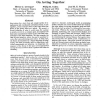Free Online Productivity Tools
i2Speak
i2Symbol
i2OCR
iTex2Img
iWeb2Print
iWeb2Shot
i2Type
iPdf2Split
iPdf2Merge
i2Bopomofo
i2Arabic
i2Style
i2Image
i2PDF
iLatex2Rtf
Sci2ools
AAAI
1990
1990
On Acting Together
Joint action by a team does not consist merely of simultaneous and coordinated individual actions; to act together, a team must be aware of and care about the status of the group effort as a whole. We present a formal definition of what it could mean for a group to jointly commit to a common goal, and explore how these joint commitments relate to the individual commitments of the team members. We then consider the case of joint intention, where the goal in question involves the team performing some action. In both cases, the theory is formulated in a logical language of belief, action, and time previously used to characterize individual commitment and intention. An important consequence of the theory is the types of communication among the team members that it predicts will often be necessary.
Related Content
| Added | 06 Nov 2010 |
| Updated | 06 Nov 2010 |
| Type | Conference |
| Year | 1990 |
| Where | AAAI |
| Authors | Hector J. Levesque, Philip R. Cohen, José H. T. Nunes |
Comments (0)

